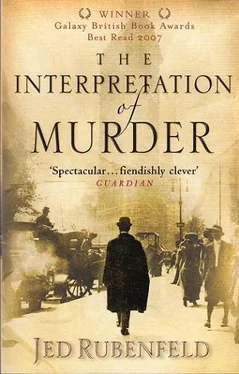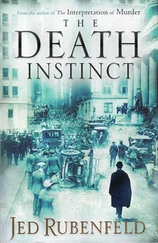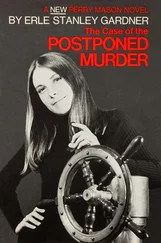Jed Rubenfeld - The Interpretation of Murder
Здесь есть возможность читать онлайн «Jed Rubenfeld - The Interpretation of Murder» весь текст электронной книги совершенно бесплатно (целиком полную версию без сокращений). В некоторых случаях можно слушать аудио, скачать через торрент в формате fb2 и присутствует краткое содержание. Жанр: Исторические приключения, на английском языке. Описание произведения, (предисловие) а так же отзывы посетителей доступны на портале библиотеки ЛибКат.
- Название:The Interpretation of Murder
- Автор:
- Жанр:
- Год:неизвестен
- ISBN:нет данных
- Рейтинг книги:5 / 5. Голосов: 1
-
Избранное:Добавить в избранное
- Отзывы:
-
Ваша оценка:
- 100
- 1
- 2
- 3
- 4
- 5
The Interpretation of Murder: краткое содержание, описание и аннотация
Предлагаем к чтению аннотацию, описание, краткое содержание или предисловие (зависит от того, что написал сам автор книги «The Interpretation of Murder»). Если вы не нашли необходимую информацию о книге — напишите в комментариях, мы постараемся отыскать её.
The Interpretation of Murder — читать онлайн бесплатно полную книгу (весь текст) целиком
Ниже представлен текст книги, разбитый по страницам. Система сохранения места последней прочитанной страницы, позволяет с удобством читать онлайн бесплатно книгу «The Interpretation of Murder», без необходимости каждый раз заново искать на чём Вы остановились. Поставьте закладку, и сможете в любой момент перейти на страницу, на которой закончили чтение.
Интервал:
Закладка:
'You are not coming with us?' he said to me, from the cocoon of his umbrella to the cocoon of mine.
'No, sir. The surgeon said I shouldn't travel for a day or two.'
'I see,' he replied skeptically. 'And Nora remains here in New York, of course.'
'Yes,' I said.
'But there is still something more, isn't there?' Freud stroked his beard.
I preferred to change the subject. 'How are things with Dr Jung, sir, if I may ask?' I knew — and Freud knew I knew — of the extraordinary scene between Jung and Freud that had taken place the other night.
'Better,' Freud replied. 'Do you know, I believe he was jealous of you.'
'Of me?'
'Yes,' said Freud. 'It finally came to me that he took my appointing you to analyze Nora as a betrayal. When I explained to him that I named you only because you live here, it improved things between us immediately.' He looked out into the rain. 'It won't last, however. Not very long.'
'I don't understand Mrs Banwell, Dr Freud,' I said. 'I don't understand her feelings for Miss Acton.'
Freud reflected. 'Well, Younger, you solved the mystery. Remarkable.'
'You solved it, sir. You warned me last night that they were all in Mrs Banwell's orbit and that Clara's friendship with Miss Acton was not entirely innocent. I don't really understand Mrs Banwell, Dr Freud. I don't understand what moved her!
'If I had to guess,' said Freud, 'I would say that Nora was for Mrs Banwell a mirror in which she saw herself as she was ten years ago — and in which she saw, therefore, by contrast, what she had become. Certainly this would account for her desire to corrupt Nora and to hurt her. You must bear in mind the years of punishment she endured as the willing object of a sadist.'
'Yet she stayed with him.' It couldn't have been only the money that kept her with Banwell. 'She was a masochist?'
'There is no such thing, Younger, not in pure form. Every masochist is also a sadist. In men, at any rate, masochism is never primary — it is sadism turned on the self — and Mrs Banwell unquestionably had a strong masculine side. She may have been plotting the destruction of her husband for some time.'
I had one other question. I was unsure whether to voice it; it seemed so basic and ignorant. But I decided to go ahead. 'Is homosexuality a pathology, Dr Freud?'
'You are wondering if Nora is a homosexual,' he said.
'I am so transparent?'
'No man can keep a secret,' Freud answered. 'If his lips are silent, he chatters with his fingertips.'
I resisted the urge to glance at my fingertips.
'No need to look at your fingertips,' he went on. 'You are not transparent. With you, my boy, I merely ask myself how I would have felt in your place. But I will answer your question. Homosexuality is certainly no advantage, but it cannot be classified as an illness. It is no shame, no vice, no degradation at all. In women in particular, there may be a primary narcissism, a self-love, that directs their desire toward others of their sex. I would not call Nora a homosexual, though. I would say, rather, she was seduced.
But I should have seen her love for Mrs Banwell at once. It was plainly the strongest unconscious current in her mental life. You told me the first day how fondly she spoke of Mrs Banwell, when of course she ought to have felt the fiercest jealousy toward a woman engaged in a sexual act with her father — an act she wished to be performing on him herself. Only the most powerful desire for Mrs Banwell could have allowed her to repress that jealousy.'
Naturally I could not wholly join in this observation. I only nodded in reply.
'You don't agree?' he asked.
'I don't believe Nora was jealous of Clara,' I said, 'in that way.'
Freud raised his eyebrows. 'You can't disbelieve that unless you reject Oedipus.'
Again I said nothing.
'Ah,' said Freud. And he repeated it: 'Ah.' He took a deep breath, sighed, and observed me closely. 'That is why you are not coming to Clark with us.'
I considered broaching with Freud my reinterpretation of the Oedipus complex. I would have liked to; I would have liked even more to discuss Hamlet with him. But I found I couldn't. I knew how much he had suffered from Jung's seeming defection. There would be other occasions. I would be in Worcester by Tuesday morning, in time for his first lecture.
'In that case,' Freud resumed, 'let me raise one possibility with you before I go. You are not the first to reject the
Oedipus complex. You will not be the last. But you may have a special reason for doing so, associated with my person. You have admired me from afar, my boy. There is always a kind of father love in such relationships. Now, having met me in the flesh, and having the opportunity to complete this cathexis, you fear doing so. You fear I will take myself away from you, as your real father did. Thus you forestall my anticipated withdrawal by denying the Oedipus complex.'
The rain beat down. Freud looked at me with kindly eyes. 'Someone has told you,' I said, 'that my father committed suicide.'
'Yes.'
'But he didn't.'
'Oh?' asked Freud.
' 'I killed him.'
'What?'
'It was the only way,' I said, 'to overcome my Oedipus complex.'
Freud looked at me. For a moment I was afraid he might actually take me seriously. Then he laughed aloud and shook my hand. He thanked me for helping him through his week in New York, and especially for rescuing his lectures at Clark. I accompanied him onto the boat. His face seemed much more deeply furrowed than it had been a week ago, his back slightly bent, his eyes a decade older. As I began to disembark, he called out my name. He was at the railing; I had taken a step or two down the gangway. 'Let me be honest with you, my boy,' he said, from under his umbrella, as the rain poured down. 'This country of yours: I am suspicious of it. Be careful. It brings out the worst in people — crudeness, ambition, savagery. There is too much money. I see the prudery for which your country is famous, but it is brittle. It will shatter in the whirlwind of gratification being called forth. America, I fear, is a mistake. A gigantic mistake, to be sure, but still a mistake.'
That was the last time I saw Freud in America. The same night, I took Nora to the top of the Gillender Building at the corner of Nassau and Wall, a place where vast fortunes were made and lost every day. On a Saturday night, Wall Street was deserted.
I had gone to the Actons' directly after seeing Freud off. Mrs Biggs greeted me like an old friend. Harcourt and Mildred Acton were nowhere to be seen; they were evidently not receiving. I asked after Nora's condition. Mrs Biggs noisily withdrew, and Nora came down presently.
Neither of us could find a word to say. Finally, I asked if she would care for a walk; I opined that it would be medically advisable. Suddenly I was sure she would decline and I would never see her again.
'All right,' she said.
The rain had stopped. The smell of wet pavement, which in the city passes for freshness, rose pleasantly in the air. Downtown, the pavement turned to cobblestone, and the clip-clop of distant horses, with no motorcar or omnibus in sight, reminded me of the New York I knew as a boy. We spoke little.
The doorman at the Gillender heard we wished to see the famous view and let us in. In the dome room, nineteen stories up, four great pointed windows overlooked the city, one facing each direction of the compass. Uptown, we could see mile after mile of the ever-expanding northward march of electric Manhattan; to the south was the tip of the island, the water, and the burning torch of the Statue of Liberty.
'They are going to demolish the building any day now,' I said. The Gillender, when erected in 1897, was one of the tallest skyscrapers in Manhattan. With its slender silhouette and classical proportions, it was also one of the most widely admired. 'It will be the tallest building in the history of the world to be torn down.'
Читать дальшеИнтервал:
Закладка:
Похожие книги на «The Interpretation of Murder»
Представляем Вашему вниманию похожие книги на «The Interpretation of Murder» списком для выбора. Мы отобрали схожую по названию и смыслу литературу в надежде предоставить читателям больше вариантов отыскать новые, интересные, ещё непрочитанные произведения.
Обсуждение, отзывы о книге «The Interpretation of Murder» и просто собственные мнения читателей. Оставьте ваши комментарии, напишите, что Вы думаете о произведении, его смысле или главных героях. Укажите что конкретно понравилось, а что нет, и почему Вы так считаете.












